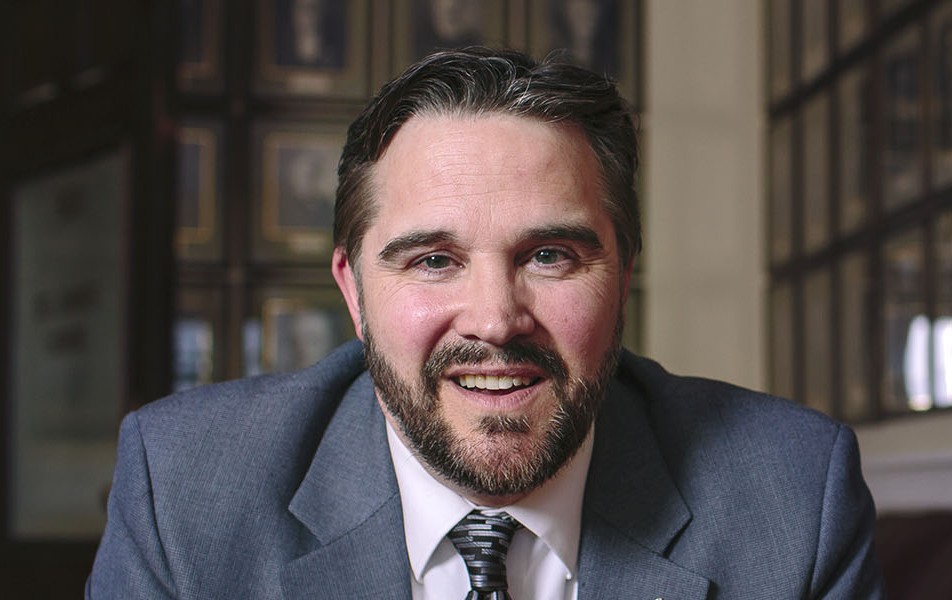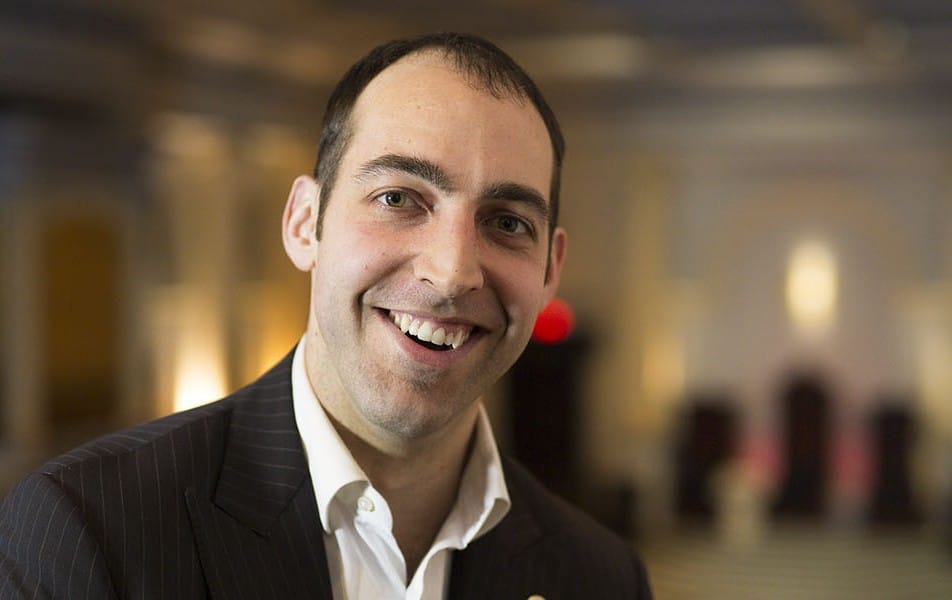Brotherhood and Union – Massachusetts Army Lodges During the American Civil War
Faith, Hope, and Charity; Brotherly Love, Relief, and Truth; Temperance, Fortitude, Prudence, and Justice. These are the ideals and virtues Freemasons strive to live by, but what do they mean when our Nation is at war – particularly at war with itself? What should Masons do? How should a Grand Lodge respond?
For Most Worshipful William Dawes Coolidge, Grand Master of Masons in Massachusetts, 1861-1862, the answer was clear – Fight to preserve the Union just like his Masonic predecessors fought to build it. As Grand Master, he was the architect of 10 Army Lodges that spread the Light of Masonry in the darkest period of this Nation’s history, and today their records and stories live on at the Samuel Crocker Lawrence Library at the Grand Lodge of Massachusetts.
Answering the Nation’s Call
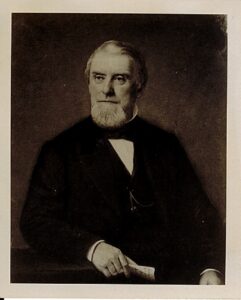
The great-grandson of Midnight Rider, Brother William Dawes, M.W. Coolidge was born and raised in Boston and in his younger years served in the Massachusetts Volunteer Militia with the Boston Light Infantry. He was raised in Columbian Lodge in 1842 and became Worshipful Master in 1852. In 1860 he served as Junior Grand Warden before his election to Grand Master in 1861.
When war broke out in April of that year, Coolidge was confronted with the rebellion in a very personal way. While travelling for business in Texas as the Director of the Buffalo Bayou, Brazos and Colorado Railway Co., he was nearly captured as a northern Yankee but was saved by Texas Masons who alerted him to his danger.
Returning to Massachusetts, Coolidge acted swiftly in his first year as Grand Master by granting dispensations for Lodges to confer all three degrees in a single day to petitioning militiamen and issued dispensations for six Army Lodges to travel with Massachusetts Regiments:
Bay State Army Lodge, No. 1 – 3d Regiment, Massachusetts Volunteer Militia
Massachusetts Army Lodge, No. 2 – 16th Regiment, Massachusetts Volunteer Infantry
United Brethren Army Lodge, No. 3 – 17th Regiment, Massachusetts Volunteer Infantry
Fraternal Army Lodge, No. 4 – 25th Regiment, Massachusetts Volunteer Infantry
Bunker Hill Army Lodge, No. 5 – 2d Regiment, Massachusetts Volunteer Infantry
Union Army Lodge, No. 6 – 1st Massachusetts Volunteer Cavalry Regiment
Of these Lodges, all but Union Army Lodge, No. 6 acted on their dispensations with Bay State Army Lodge, No. 1 receiving their dispensation on May 6, 1861, less than a month after the 3d Regiment was called to federal service.
In 1862, M.W. Coolidge issued another five dispensations for Army Lodges:
McClellan Army Lodge, No. 6 – 43d Regiment, Massachusetts Volunteer Infantry
Berkshire Camp Army Lodge, No. 7 – 49th Regiment, Massachusetts Volunteer Infantry
Putnam Army Lodge, No. 8 – 39th Regiment, Massachusetts Volunteer Infantry
Olive Branch Army Lodge, No. 9 – 42d Regiment, Massachusetts Volunteer Infantry
Warren Army Lodge, No. 10 – 32d Regiment, Massachusetts Volunteer Infantry
Discontent at Grand Lodge
M.W. Coolidge’s actions were not without their detractors however, and in December of 1862 he lost his bid for re-election to Worshipful Brother William Parkman, likely over concerns that his leniency in granting dispensation for degrees to militiamen was in violation of the Grand Constitution. In his outgoing address at the 1862 Feast of St. John he stood tall, defending his decisions as Grand Master:
“For this state of war there is no precedent, nor is there precedent for such a sudden influx into the Institution from the Army, of those, who, from the circumstances of the case, must be made “at sight,” the prerogative alone of the Grand Master, as I am taught by a strict examination of the ancient landmarks, and the best council of the wise and prudent, whom we all revere. I have met this pressure readily and earnestly, for it has been made by those whose patriotic impulses have led them forth to battle for their country; to stand for you and me, and bare their breasts to the bullet aimed at the nation’s heart, and I could not find it in my own to refuse any aid, comfort or protection which I might be instrumental in throwing around them.”
Army Lodges at War
With the election of Most Worshipful William Parkman to the office of Grand Master, the Grand Lodge’s focus shifted away from the war, but the Army Lodges persevered through success and tragedy. Below is a brief sketch of just a few of these lodges:
Fraternal Army Lodge, No. 4 under the leadership of Wor. Lt. Joseph B. Knox from 1861-65, traveled through Maryland, Virginia, and North Carolina and frequently hosted dozens of Masons from North and South during their meetings. Between their military service and many meetings, the Brethren of this Lodge protected ransacked Lodge buildings they encountered, secured Masonic regalia at risk of being stolen, and met with Masons being held as prisoners of war.
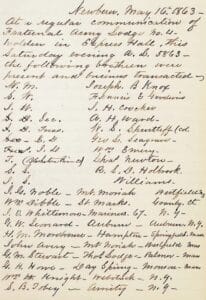
Bunker Hill Army Lodge, No. 5 began in the personal quarters of Wor. Col. George H. Gordon while encamped in Frederick, Maryland in 1861. There they initiated and passed three Fellowcrafts: Bro. Charles Wheaton, Bro. Charles Mudge, and Bro. Robert Brown. In 1862-63 the Lodge and the Regiment suffered immensely, fighting through the Battles of Cedar Mountain, Antietam, Chancellorsville, and Gettysburg. By the end of 1863 only two of the original eight Masons remained and as for their candidates: Bro. Wheaton was transferred to a new Regiment, Bro. Mudge was killed at Gettysburg commanding the 2d, and only Bro. Brown was raised during the Lodge’s revival in 1864. The Regiment’s Chaplain and Senior Warden, Bro. Alonzo H. Quint, led the Lodge in this second phase of its history and recorded that dozens of Masons from North and South joined them as visitors until the 2d joined Maj. Gen. Sherman’s March to the Sea.
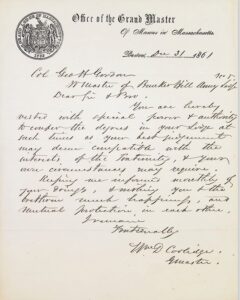
Putnam Army Lodge, No. 8 led by Wor. Col. Phineas S. Davis was among the most active Army Lodges despite the hardships they faced at war. Fighting through the Battles of the Wilderness, Spotsylvania, and Cold Harbor as well as the Siege of Petersburg, by the end of the war the Worshipful Master, Senior Deacon, Junior Steward, and Marshal had been killed and the Treasurer and Secretary captured. Despite this, the Lodge raised 39 Master Masons in 1864 alone.

The story of these Lodges is one of hardship, tragedy, brotherly love, and persistence. Today, through record books, letters, periodicals, and other archival holdings at the Samuel Crocker Lawrence Library, their history is preserved.
Want to learn more?
View the digitized collection here or contact the Librarian, Wor. Matthew Ahern, with additional questions: mahern@massfreemasonry.org

